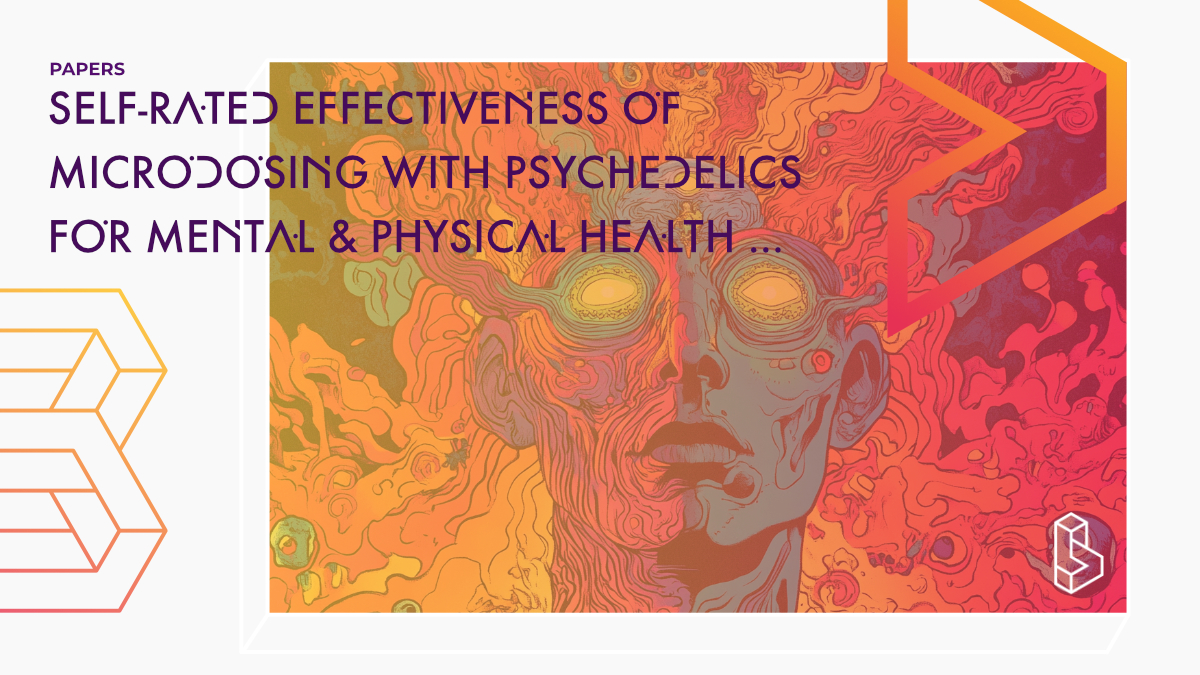This survey study (n=410) showed that those with mental & physical health problems self-rated the effectiveness of microdosing as higher than conventional treatments in regards to ADHD/ADD and anxiety. They rated it as less effective than a high dose of psychedelics.
Abstract of Self-Rated Effectiveness of Microdosing With Psychedelics for Mental and Physical Health Problems Among Microdosers
“Background: There is a growing interest in the use of psychedelic substances for health related purposes, including symptom relief for disorders like anxiety, depression, and pain. Although the focus of recent clinical trials has been on high doses of these substances, anecdotal evidence suggests that low (micro) doses are also effective, and may be more suitable for certain conditions. Nonetheless, empirical evidence regarding the efficacy of microdosing with psychedelics for symptomatic relief is lacking. The present study aimed to investigate, by means of an online questionnaire, the self-rated effectiveness (SRE) of microdosing with psychedelics (MDP) for mental and physiological disorders compared to the conventional prescribed treatment and to regular doses of psychedelics.
Methods: An online questionnaire was launched on several websites and fora between March and July 2018. Respondents who had consented, were 18 years of age or older, had experience with microdosing and were diagnosed with at least one mental or physiological disorder by a medical doctor or therapist (N = 410; 7.2%) were included in the analyses. Odds ratio were calculated to compare the SRE of MDP with conventional treatment, and regular psychedelic doses for mental and physiological diagnoses for each of the three effectiveness questions (“Did it work,” “Symptom disappear,” “Quality of life improved”).
Results: Odds ratio showed that SRE of MDP was significantly higher compared to that of conventional treatments for both mental and physiological diagnoses; and that these effects were specific for ADHD/ADD and anxiety disorders. In contrast, SRE of MDP was lower compared to that of higher, regular psychedelic doses for mental disorders such as anxiety and depression, while for physiological disorders no difference was shown.
Conclusion: This study demonstrates that SRE of MDP to alleviate symptoms of a range of mental or physiological diagnoses is higher compared to conventionally offered treatment options, and lower than regular (‘full’) psychedelic doses. Future RCTs in patient populations should objectively assess the effectivity claims of psychedelics, and whether these are dose related, disorder specific, and superior to conventional treatments.“
Authors: Nadia R. P. W. Hutten, Natasha L. Mason, Patrick C. Dolder & Kim P. C. Kuypers
Summary of Self-Rated Effectiveness of Microdosing With Psychedelics for Mental and Physical Health Problems Among Microdosers
The researchers begin by noting the growing interest in using psychedelic substances for health-related purposes, including symptom relief for disorders like anxiety, depression, and pain. While recent clinical trials have focused on high doses of these substances, anecdotal evidence suggests that low doses (microdoses) may also be effective and potentially more suitable for certain conditions. However, empirical evidence regarding the efficacy of microdosing psychedelics for symptomatic relief is lacking.
The study aimed to investigate the self-rated effectiveness (SRE) of microdosing psychedelics for mental and physiological disorders compared to conventional prescribed treatments and regular doses of psychedelics. This was done through an online questionnaire distributed to individuals with experience in microdosing.
Methods
Find this paper
https://doi.org/10.3389/fpsyt.2019.00672
Open Access | Google Scholar | Backup | 🕊
Cite this paper (APA)
Hutten, N. R., Mason, N. L., Dolder, P. C., & Kuypers, K. P. (2019). Self-rated effectiveness of microdosing with psychedelics for mental and physical health problems among microdosers. Frontiers in psychiatry, 10, 672.
Study details
Topics studied
Anxiety
Pain
Microdosing
Study characteristics
Survey
Participants
410
Humans
Authors
Authors associated with this publication with profiles on Blossom
Kim KuypersKim Kuypers is a researcher at Maastricht University. Her work is concerned with understanding the neurobiology underlying flexible cognition, empathy, and well-being. One of the main ways she does is with the use of psychedelics.
Institutes
Institutes associated with this publication
Maastricht UniversityMaastricht University is host to the psychopharmacology department (Psychopharmacology in Maastricht) where various researchers are investigating the effects of psychedelics.

